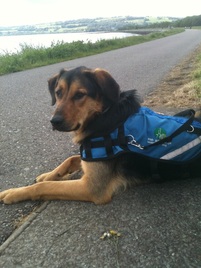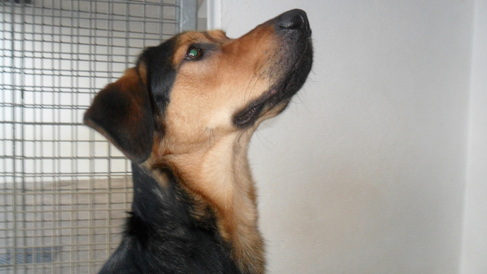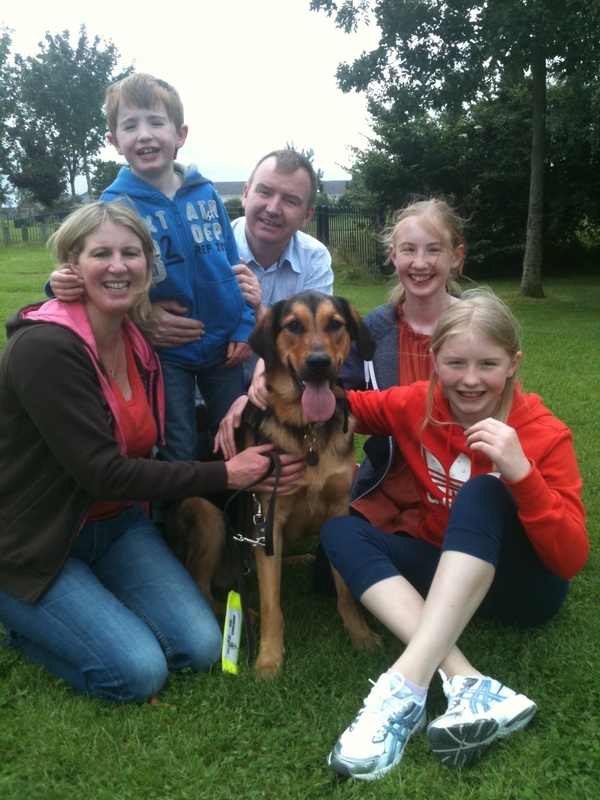
The last week of training (week 11) is all about revision. I practice the routes that Hector will be doing with his new handler on class.
The routes include:estate walk, Suburban walk, Urban walk, Country walk, Park, playground and pond walk. Public Transport, Pet shop, Café/shop training, Trolley/buggy
training.
We babysit the dogs a lot in the last week so that they do not get hurt or injured so they are not allowed free run for 10 days before class. The play
sessions are in very small groups and very much supervised. It would be very upsetting to get the dogs to this stage of training and for them to get injured just playing around.I also prepare the pack of equipment that the new
handler will need for their new dog.

Although the week of training is a very nice week it is very intense and can be a little daunting. The new handler has to cope with a lot in a short period of time. It can be hard for the dogs to switch allegiance to the new handlers and very hard for me to ignore my dogs when they are looking to me for reassurance. But, it is all part of the job and it is so worthwhile when I see the difference that these dogs make to the lives of the children and their families.
Generally speaking once the new handlers start to feed their dogs the allegiance starts to change pretty quickly! Usually by day 3 the dogs are looking more to their new handlers than they are to me. Hector, being part German Shepherd finds switching allegiance quite challenging. This can be shown in some vocal behaviour such as a little bit of whining or crying. Or it can be shown in physical behaviour such as going off his food or getting very distracted when I am around. This passes overtime and they being very loyal and work very well for their new handlers.
The first few days of class I do some one on one training, particularly obedience training with the new handlers. As the week goes on we do more group work and as their confidence grows with dog handling we go to more challenging environments.
The course includes a number of lectures during the week:
Health & welfare : Kennel team
Weight management: Kennel team
Grooming: Kennel Team
Access & Education: Léan Kennedy
Fundraising talk: Fundraising team
Dog Communication & body language: Instructor
The week is very tiring for everyone, particularly the dogs. During the training weeks with me I work them one by one and they usually get two sessions a day totalling about an hour to an hour and a half. When they are on class they work all day (with rest periods obviously). It can be tough on the dogs and they may carry a little stress in the body so on Friday we usually bring the dogs for a free run.
Around lunch time on Friday the handlers go home with their new dog. This is an exciting time. It is also when I am like a mum sending my kids to school for the first time! I worry about them, I hope they are ok, I hope they will be well looked after and will settle well. I also hope they won’t misbehave. It is always lovely to get the message from the handlers to say that they have arrived home safely and all is going well.
The first weekend is all about settling the dog into their new home and ideally establishing a toileting routine. Our dogs much prefer the home environment but it is obviously a stressful time for them as they have to adapt to another new environment and a new family.
The first weekend is really important so we advise that there is no big welcome home party with all the relations and neighbours holding balloons and bangers. The first weekend should be nice and calm with immediate family only. The kids can make welcome home posters and they will obviously be excited but we teach the handlers how to manage this and how to get their dog nice and settled. The dogs toileting routine can often go out of sync with the change so we expect the handler to help them to establish a good routine.
Week 13, 14& 15 – Child training
I usually train 5 parents (handlers) from 5 different families on one class. Over weeks 13, 14 and part of week 15 I see each family on average of 4 times. This is usually sufficient to get them started with their work. The first visit is usually the longest where we spend most of the time talking about how the dog has settled into the home, any teething problems such as crying or barking, any toileting problems. All going well we hope to do the first attachment on the first visit but this will depend on how the first weekend has gone. Every dog is very different, every child is very different and every family is very different so the rate of progress will vary hugely.
It is very important that the first attachment with the child with Autism is done when the instructor is present as if it is not successful it can be very tough to rectify. The first attachment is generally very short, high incentive and we use anything we can to make it a positive experience for the child. It is an exciting time and a challenging time for everyone involved.
Generally speaking after the first few weeks the handler’s are able to start going out on their own with their child and their dog. I then leave them alone for a few weeks to practice but I am always at the end of the phone if there are any problems. At around 6 weeks I visit again and see how they are progressing. I recommend any adjustments needed and set new goals for the next period.
I then leave them alone for about 6 months and see them again. After that the families get a visit at around 12 months from the 6 month visit. This is done by any of our instructors who are working in the area. After that, we no longer schedule visits but if any family needs support and it cannot be done over the phone then we will schedule a visit.
I must say, I am very privileged to work on this programme and to see the changes that our dogs make to these families lives. Over the last few years
working on this programme I have received some lovely emails, text messages, photos, thank you cards and phone calls from the families. It makes all the hard work very rewarding and handing the dogs over a lot
easier. I often feel it is easier for the instructors to hand over the dogs than it is for any of the previous handlers especially the puppywalkers. The reason for this is that I get to see the difference that they make and I get to see how well they are treated in their new homes. Some of the children with autism may develop a bond with their dog and if this does happen it is a huge bonus and beautiful to see. Other children with autism may not have this capability however the rest of the family members provide ample love and attention to their 4 legged furry friend.
Its been a pleasure to write this blog and to work with Hector and the De Burca/Peters family.
Thanks Aile

 RSS Feed
RSS Feed
